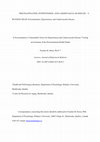Papers by Fuschia M. Sirois

Preventive medicine reports, 2015
This study tested a self-regulation resource model (SRRM) of self-compassion and health-promoting... more This study tested a self-regulation resource model (SRRM) of self-compassion and health-promoting behavior intentions in emerging adults. The SRRM posits that positive and negative affect in conjunction with health self-efficacy serve as valuable self-regulation resources to promote health behaviors. An online survey was completed by 403 emerging adults recruited from the community and a Canadian University in late 2008. Multiple meditation analyses with bootstrapping controlling for demographics and current health behaviors tested the proposed explanatory role of the self-regulation resource variables (affect and self-efficacy) in linking self-compassion to health behavior intentions. Self-compassion was positively associated with intentions to engage in health-promoting behaviors. The multiple mediation model explained 23% of the variance in health behavior intentions, with significant indirect effects through health self-efficacy and low negative affect. Interventions aimed at in...

BMC Complementary and Alternative Medicine, 2016
Research on continued CAM use has been largely atheoretical and has not considered the broader ra... more Research on continued CAM use has been largely atheoretical and has not considered the broader range of psychological and behavioral factors that may be involved. The purpose of this study was to test a new conceptual model of commitment to CAM use that implicates utilitarian (trust in CAM) and symbolic (perceived fit with CAM) in psychological and behavioral dimensions of CAM commitment. A student sample of CAM consumers, (N = 159) completed a survey about their CAM use, CAM-related values, intentions for future CAM use, CAM word-of-mouth behavior, and perceptions of being an ongoing CAM consumer. Analysis revealed that the utilitarian, symbolic, and CAM commitment variables were significantly related, with r's ranging from .54 to .73. A series hierarchical regression analyses controlling for relevant demographic variables found that the utilitarian and symbolic values uniquely accounted for significant and substantial proportion of the variance in each of the three CAM commitment indicators (R (2) from .37 to .57). The findings provide preliminary support for the new model that posits that CAM commitment is a multi-dimensional psychological state with behavioral indicators. Further research with large-scale samples and longitudinal designs is warranted to understand the potential value of the new model.
Perfectionism, Health, and Well-Being, 2015

Cogent Psychology, 2015
Despite a growing body of research on the consequences of procrastination for health and well-bei... more Despite a growing body of research on the consequences of procrastination for health and well-being, there is little research focused on testing or explaining the potential links between procrastination and sleep quality. Using the procrastination-health model as our guiding conceptual lens, we addressed this gap by examining how and why trait procrastination may be linked to various dimensions of sleep quality across two student samples. In Study 1, procrastination was associated with feeling unrested, but not with sleep disturbance frequency, in a sample of Greek undergraduate students (N = 141). In Study 2, bootstrapping analysis of the indirect effects of procrastination on an index of sleep quality through perceived stress in a sample of Canadian students (N = 339) was significant, supporting an extended procrastination-health model view of how chronic self-regulation failure may compromise sleep quality. Given the potential for dynamic and reciprocal relations among procrastination, stress, and sleep quality, suggested by the current and other research, the ways in which procrastination may contribute to and be influenced by poor sleep quality warrant further investigation.

The Clinical Journal of Pain, 2015
Pain and its disruptive impact on daily life are common reasons that patients seek primary medica... more Pain and its disruptive impact on daily life are common reasons that patients seek primary medical care. Pain contributes strongly to psychopathology, and pain and depressive symptoms are often comorbid in primary care patients. Not all those who experience pain develop depression, suggesting the presence of individual-level characteristics, such as positive and negative affect, that may ameliorate or exacerbate this association. We assessed the potential moderating role of positive and negative affect on the pain-depression linkage. In a sample of 101 rural, primary care patients, we administered the Brief Pain Inventory, NEO Personality Inventory - Revised positive and negative affect subclusters and the Center for Epidemiology Scale for Depression. In moderation models, covarying age, sex and ethnicity, we found that positive affect, but not negative affect, was a significant moderator of the relation between pain intensity and severity and depressive symptoms. The association between pain and depressive symptoms is attenuated when greater levels of positive affect are present. Therapeutic bolstering of positive affect in primary care patients experiencing pain may reduce risk for depressive symptoms.
Personality and Individual Differences, 2015

Journal of behavioral medicine, Jan 25, 2015
Personality is an important epidemiological factor for understanding health outcomes. This study ... more Personality is an important epidemiological factor for understanding health outcomes. This study investigated the associations of trait procrastination with hypertension and cardiovascular disease (HT/CVD) and maladaptive coping by testing an extension of the procrastination-health model among individuals with and without HT/CVD. Individuals with self-reported HT/CVD (N = 182) and healthy controls (N = 564), from a community sample, completed an online survey including measures of personality, coping, and health outcomes. Logistic regression analysis controlling for demographic and higher order personality factors found that older age, lower education level and higher procrastination scores were associated with HT/CVD. Moderated mediation analyses with bootstrapping revealed that procrastination was more strongly associated with maladaptive coping behaviours in participants with HT/CVD than the healthy controls, and the indirect effects on stress through maladaptive coping were larg...
The Journal of Alternative and Complementary Medicine, 2014
Sirois, F. M. (2014). Health-related self-perceptions over time and provider-based Complementary ... more Sirois, F. M. (2014). Health-related self-perceptions over time and provider-based Complementary and Alternative Medicine (CAM) use in people with inflammatory bowel disease or arthritis.

PsycEXTRA Dataset, 2000
The present study sought to extend previous research suggesting a relationship between trait proc... more The present study sought to extend previous research suggesting a relationship between trait procrastination and health behaviors by examining the behavioral intentions of procrastinators. Two cognitive variables (self-efficacy and the consideration of future consequences) were proposed to mediate the procrastination-intentions relationship. Students (n = 182) were administered personality and health-related questionnaires and then asked to recall a past illness episode along with health behaviors that may have improved or prevented this experience. Intentions to actually perform one of the listed behaviors in the near future were then rated. A negative relation between trait procrastination and intentions to engage in health behaviors was found. Further, the weak intentions of procrastinators were mediated by a lower health-specific self-efficacy. The consideration of future consequences did not play a role in the procrastination-intentions relationship although it was moderately and negatively related to trait procrastination. These findings were consistent with the role of self-efficacy in intentions as theoretically proposed, and with previous work suggesting that procrastination is associated with low perceived behavioral control.
Research on why some people stay healthy while others get ill has often turned to examining how p... more Research on why some people stay healthy while others get ill has often turned to examining how personality may play a role. In general, there tends to be two main reasons why certain people are more or less prone to staying healthy. First, certain personality or behavioural styles may make people more vulnerable to experiencing higher levels of stress. This higher stress in turn is known to have harmful effects on health by compromising the healthy functioning of the immune system and the cardiovascular system. The effect in the short term may be increased vulnerability to viral and bacterial infections, and vulnerability for more threatening conditions such as cancer and heart disease in the long term.
Psychotherapy and psychosomatics, 2014

Research into why individuals do or do not engage in important health behaviors is often approach... more Research into why individuals do or do not engage in important health behaviors is often approached from the perspective of expectancy-value theories of motivation. Such theories suggest that the motivation to engage in a behavior is regulated by the outcome expectancies for the behavior and the value of the outcome. However, the relationship of expectancies and values to stable individual differences known to affect motivation are often overlooked. In this chapter the links between procrastination, a behavioral style known to be linked to poor health behaviors, and household safety behaviors were examined using an expectancy-value theory (EVT) framework. Adults (N = 254) recruited from the community and the Internet completed self-report measures of procrastination, health self-efficacy, household safety behaviors, previous experiences with household accidents, and questions about the importance of keeping their homes free from potential accidents. Despite the fact that chronic procrastinators were more likely to have experienced a household accident that could have been prevented, procrastination was negatively related to the performance of household safety behaviors. Procrastination was also negatively related to health-self-efficacy and household safety value. Hierarchical regression testing the EVT variables found support for the predictive value of both outcome expectancies (self-efficacy) and value, but not their product, in explaining household safety behaviors after controlling for procrastination. Separate path Fuschia M. Sirois 2 analyses tested whether self-efficacy and valuing household safety mediated the relationship between procrastination and household safety behaviors. Safety value and self-efficacy each partially mediated the procrastination-household safety behaviour relationship after controlling for procrastination. These findings suggest that EVT may be useful for explaining motivations for household safety behaviors in general, and may also provide insight into the lack of motivation for these behaviors demonstrated by procrastinators.

Recent theory suggests that trait procrastination is a form of temporal self-regulation failure t... more Recent theory suggests that trait procrastination is a form of temporal self-regulation failure that reflects a disjunction between the present and future self. Yet research to date is sparse and inconsistent regarding the nature of the associations of procrastination with time perspective. The current study aimed to meta-analytically summarize the evidence to date to address the question of how procrastination is linked to future and present time perspective, and to test whether stress and positive affect explained the link between procrastination and future time perspective. A search of the available literature yielded six published studies and three unpublished studies which were combined with five unpublished data sets for a total of fourteen samples with 4,312 participants. The meta-analysis revealed that procrastination had a moderate and significant negative association with future time perspective, and a small but significant positive association with present time perspective. Mediation analyses across two of the samples found that high stress and low positive affect explained in part the association between procrastination and future time perspective. Overall, these findings support the notion that procrastinators focus less on the future and highlight the dynamic interrelations of affect and cognition that underlie procrastinators' intertemporal choices.







Uploads
Papers by Fuschia M. Sirois